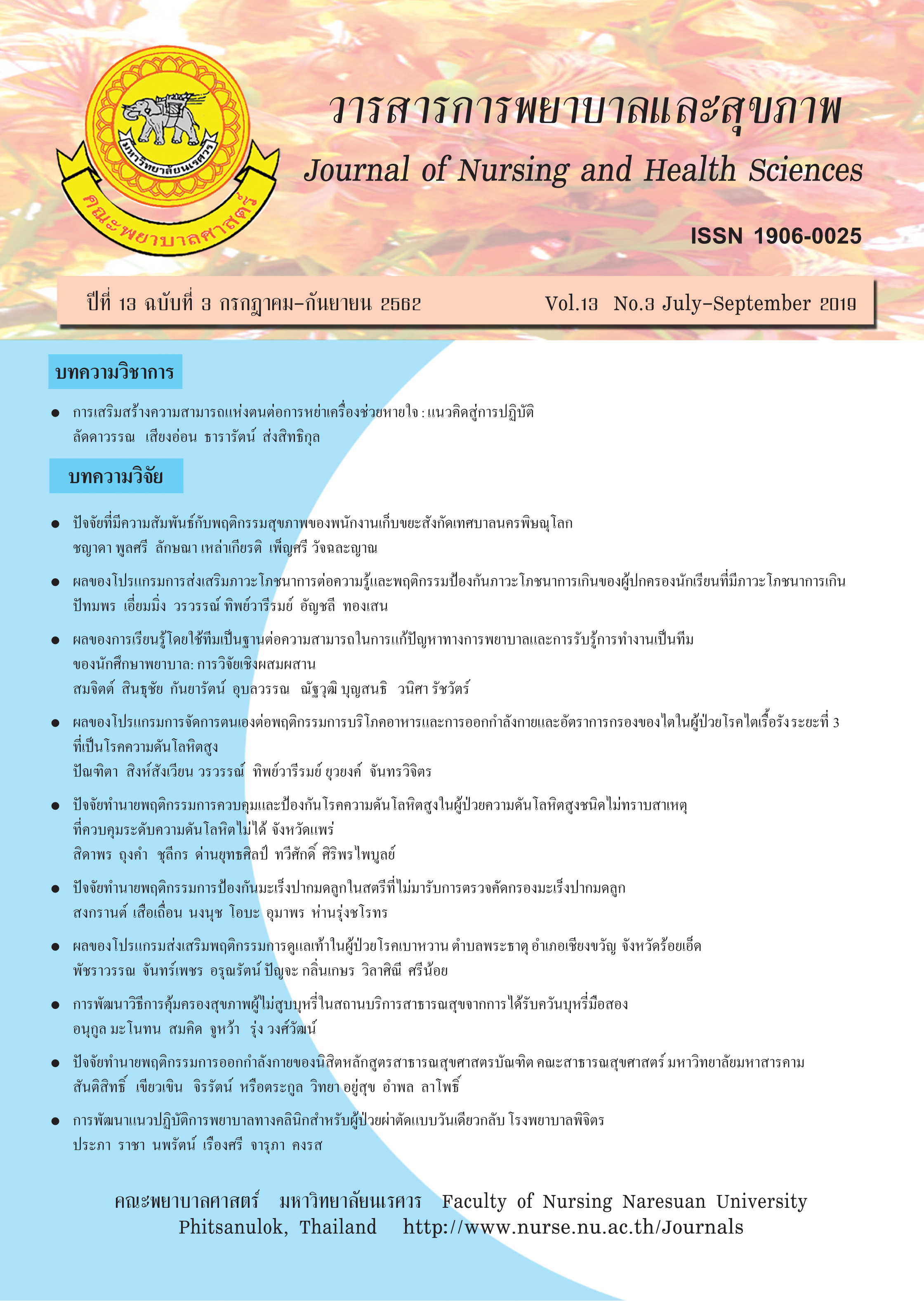Enhancing self-efficacy for weaning ventilator : concepts to practice
Main Article Content
Abstract
Professional nurses play an important role in providing care for patients. In particular, patients who are admitted to the intensive care unit with respiratory failure must use a ventilator for a long time without being able to weaning the ventilator. It was found that most cases were caused by physiological and perceived factors. Under perceived factors, self-efficacy, can be developed by using 4 sources of information (1) Modeling (2) Mastery experiences (3) Emotional arousal and (4) Verbal persuasion (Bandura, 1977). If nurses are able to utilize all 4 sources to develop the patient's ability to perceive their own abilities weaning respirator with encouragement to patients, this can be a guideline that will help patients achieve the success of a ventilator as expected.
Article Details
References
Bandura, A. (1977). Social learning theory. Englewood Cliffs, N.J.: Prentice-Hall.
Burns, S.M., Fisher, C.E., Tribble, S.S., Lewis, R., Merrel, P., Conaway, M.R., …Bleck, T.P. (2010). Multifactor clinical score and outcome of mechanical ventilation weaning trials : Burns wean assessment program. American Journal Critical Care, 19(5), 431-439.
De, Jonghe B., Bastuji-Garin, S., Durand, M.C., Malissin, I., Rodrigues, P., Cerf, C., …Sharshar, T. (2007). Respiratory weakness is associated with limb weakness and delayed weaning in critical illness, Critical Care Medicine, 35(9), 2007-2015.
Leo, M. H., & Van Der Hoeven J.G. (2010). Clinical review: The ABC of weaning failure - a structured approach. Critical Care, 14(6), 1-9.
Klinchet, N., Wattanakitkrileart, D., Charoenkitkarn, V., & Wongsurakiat, P. (2015). Influences of creatinine clearance, cough effectiveness, perceived sleep quality, perceived ... breathing trial in patients with simple ventilator weaning. Journal of The Royal Thai Army Nurses, 16(3), 105-113. [In Thai].
Kumar, G., Majumdar, T., Jacobs, E.R., Danesh, V., Dagar, G., Deshmukh, A., …Nanchal, R. (2013). Outcomes of morbidly obese patients receiving invasive mechanical ventilation. Chest Journal, 144(1), 48-54.
Mamary, A.J., Kondapaneni, S., Vance, G.B., Gaughan, J.P., Martin, U.J., & Criner, G.J. (2011). Survival in patients receiving prolonged ventilation: Factors that influence outcome. Clinical Medicine Insights : Circulatory, Respiratory and Pulmonary Medicine, 5, 17–26.
McConville, F. John., & Kress, P. John. (2012). Weaning patients from the ventilator. The New England Journal of Medicine, 367(23), 2233-2239.
Pachakawe, M., Binhsen,V., & Pakdevong, N. (2019). Factors predicting outcome of extubation in critically Ill patients in intensive care unit, Singburi Hospital. Journal of Nursing and Health Care, 37(1), 108-117. [In Thai].
Pathomjaruwat, T., Wattanakitkrileart, D., Pinyopasakul, W., & Wongsurakiat, P. (2013). Correlation between awareness of self performance, of disorder severity and of anxiety, and duration of spontaneous breathing trial in patients not having been weaned off respirators. Thai Journal of Nursing Council, 28(1), 49-63. [In Thai].
Perren, A., Previsdomini, M., Llamas, M., Cerutti, B., Györik, S., Merlani, G.,…Jolliet, P. (2010). Patients' prediction of extubation success. Intensive Care Medicine, 36(12), 2045-2052.
Ramadan, M. Nafae., Mohammed, A. Mohammed., Amani, F. Morsi ., & Dalia, A. Ibrahim. (2014). Thyroid function in respiratory failure patients. Egyptian Journal of Chest Diseases and Tuberculosis, 63(2), 513-521.
Ranron, T. (2014) Predicting factor of successful weaning from mechanical ventilator in critically ill patients. Master Thesis (Nursing), Chulalongkorn University, Bangkok. [In Thai].
Salam, A., Tilluckdharry, L., Amoateng-Adjepong, Y., & Manthous, C.A. (2004). Neurologic status, cough, secretions and extubation outcomes. Intensive Care Medicine, 30(7), 1334-1339.
Savi, A., Teixeira, C., Silva, J.M., Borges, L.G., Pereira, P.A., Pinto, K.B., …Vieira, S.R. (2012). Weaning predictors do not predict extubation failure in simple-to-wean patients. Journal of Critical Care, 27(2), 221-228.
Sing Buri Hospital. (2016). Intensive care nurse service quality report, Nursing mission group, Sing Buri. Sing Buri: Sing Buri Hospital. [In Thai].
Su, W.L., Chen, Y.H., Chen, C.W., Yang, S.H., Su, C.L., Perng, W.C., …Chen, J.H. (2010). Involuntary cough strength and extubation outcomes for patients in an ICU. Chest Journal, 37(4), 777-782.
Tiasawat, U., Saensom, D., Namuangchan, A., Tansura, S., Boonloy, Y., & Songserm, A. (2017). Development of a clinical nursing practice guideline for mechanically ventilated patients in critical care department, Khon Kaen Hospital. Journal of Nursing and Health Care, 35(1), 194-206. [In Thai].
Twibell, R., Sicla, D., & Mahmoodi, M. (2003). Subjective perception and physiological variables during weaning from mechanical ventilation. American Association of Critical Care, 12(2), 104-112.
Udchumpisai, M., Na Ayuthya, K., Pongthavornkamon, K., & Wngsurakiat, P. (2010). Factors influencing prolonged mechanical ventilation in critically-ill medical patients. Thai Journal of Cardio-Thoracic Nursing, 21(1), 14-30. [In Thai].


